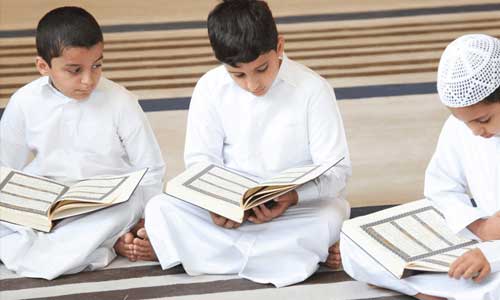Surah Al-Waqiah stands as one of the most powerful and thought-provoking chapters in the Holy Quran, offering believers a vivid glimpse into the reality of the Day of Judgment and the eternal life that awaits humanity. Known as “The Inevitable Event,” this remarkable surah holds the 56th position in the Quran and consists of 96 verses that deliver profound spiritual truths about life, death, and the hereafter.
As a Meccan surah, Al-Waqiah was revealed during the early period of Prophet Muhammad’s mission, addressing the fundamental questions about human existence and divine justice. The central theme revolves around the Day of Judgment and the afterlife, presenting a comprehensive view of what awaits humanity beyond this temporal world.
Background and Historical Context
The revelation of Surah Al-Waqiah came during a time when the early Muslim community in Mecca faced significant challenges and persecution. The surah’s name, “Al-Waqiah,” translates to “The Event” or “The Inevitable,” referring specifically to the Day of Judgment that will undoubtedly come to pass.
This chapter belongs to the category of eschatological surahs in the Quran, which focus on the end times and the afterlife. It shares thematic connections with other surahs that discuss the Day of Judgment, such as Surah Al-Qiyamah (The Resurrection) and Surah Al-Haqqah (The Reality), creating a comprehensive Islamic perspective on the ultimate destiny of human souls.
The historical context of its revelation provides insight into why these powerful descriptions of the afterlife were so crucial for the early Muslim community. During times of hardship and uncertainty, believers needed reassurance about divine justice and the ultimate triumph of truth over falsehood.
Structure and Divine Organization
Opening Verses: The Certainty of Judgment (Verses 1-10)
The surah begins with a powerful declaration about the inevitability of the Day of Judgment. These opening verses establish the absolute certainty of this cosmic event, emphasizing that there is no doubt about its occurrence. The Arabic term “Waqi’ah” carries the meaning of something that will definitely happen, removing any possibility of denial or avoidance.
The verses describe the earth-shaking events that will accompany this day, including mountains being scattered like dust and the complete transformation of the known world. This vivid imagery serves to awaken human consciousness to the temporary nature of worldly life and the permanent reality of the hereafter.
The Three Categories of Humanity (Verses 11-56)
One of the most significant aspects of Surah Al-Waqiah is its detailed classification of humanity into three distinct groups based on their deeds and spiritual state:
As-Sabiqun (The Foremost/Predecessors): This group represents the highest rank of believers who excelled in faith and righteous actions. They are described as those who rushed toward good deeds and maintained unwavering devotion to Allah throughout their lives.
Ashab al-Yamin (Companions of the Right): These are the general believers who lived righteous lives and followed the path of faith. They represent the majority of successful believers who will be rewarded with Paradise.
Ashab ash-Shimal (Companions of the Left): This category includes those who rejected faith and engaged in wickedness. They will face the consequences of their choices in the afterlife.
Divine Signs in Creation (Verses 57-74)
The surah presents powerful arguments about Allah’s creative power through observable phenomena in nature. These verses discuss the creation of human beings, the provision of sustenance through agriculture, and the blessing of water and fire as essential elements for human survival.
The Majestic Oath (Verses 75-82)
The surah contains a solemn oath by the positions of the stars, emphasizing the magnificent nature of the Quran’s revelation. This section highlights the honor and sanctity of the divine scripture.
Final Destinations (Verses 83-96)
The concluding verses describe the soul’s departure from the body and the different destinations awaiting the three categories of people, reinforcing the central message of divine justice and accountability.
Key Themes and Profound Messages
The Three Categories of Humanity Explained
As-Sabiqun (The Foremost): These individuals represent the pinnacle of spiritual achievement. They are characterized by their eagerness to perform good deeds, their consistent remembrance of Allah, and their dedication to serving others. The surah describes their rewards in Paradise with imagery of luxury, comfort, and eternal bliss.
Ashab al-Yamin (Companions of the Right): This group encompasses righteous believers who lived according to Islamic principles. While they may not have reached the highest spiritual ranks, their sincere faith and good deeds earn them a place in Paradise with abundant rewards and lasting happiness.
Ashab ash-Shimal (Companions of the Left): These are individuals who rejected faith and engaged in wrongdoing. The surah describes their fate with vivid imagery of punishment and suffering, serving as a warning about the consequences of a life lived in defiance of divine guidance.
Detailed Descriptions of Paradise
The surah provides some of the most beautiful descriptions of Paradise found in the Quran. These include:
- Physical Comforts: Believers will enjoy the finest foods, drinks, and luxurious accommodations that surpass anything known in this world.
- Spiritual Pleasures: The ultimate reward is the pleasure of Allah and the peace that comes from being close to the divine presence.
- Eternal Nature: All rewards in Paradise are permanent and will never diminish or disappear.
- Companionship: Believers will be in the company of the righteous and will enjoy pure relationships free from jealousy or negativity.
Vivid Descriptions of Hell
The surah also contains clear warnings about the punishment awaiting those who reject faith:
- Types of Torment: Various forms of suffering are described, including intense heat, bitter drinks, and psychological anguish.
- Divine Justice: The punishments are portrayed as just consequences for deliberate choices made in worldly life.
- Proportional Retribution: The severity of punishment corresponds to the gravity of sins committed.
Divine Signs in Creation and Natural Phenomena
Surah Al-Waqiah draws attention to various aspects of creation as signs of Allah’s power and wisdom:
Human Creation and Development
The surah reminds readers about the miraculous process of human creation, from the initial stage of conception to the development of a complete human being. This serves as evidence of divine power and design in the universe.
Agricultural Provisions and Sustenance
The verses discuss how Allah provides sustenance through agriculture, highlighting the intricate systems that allow crops to grow and provide nourishment for humanity. This includes the provision of water, soil, and favorable conditions for plant growth.
Water and Fire as Divine Gifts
The surah emphasizes two essential elements that make life possible: water and fire. These elements are presented as divine gifts that demonstrate Allah’s care for His creation and His power over the natural world.
The Majesty of Quranic Revelation
The surah presents the Quran itself as a miraculous sign, describing its noble status and the honor accorded to those who preserve and recite it. This reinforces the divine origin of the scripture and its role as guidance for humanity.
Spiritual and Practical Lessons for Daily Life
Preparation for the Afterlife
The primary lesson of Surah Al-Waqiah is the importance of preparing for the afterlife through righteous deeds and sincere faith. This preparation involves:
- Regular Worship: Maintaining consistent prayer, remembrance of Allah, and other acts of worship.
- Good Character: Developing noble qualities such as honesty, compassion, and integrity.
- Service to Others: Helping those in need and contributing positively to society.
- Continuous Learning: Seeking knowledge about faith and implementing it in daily life.
Reflection on Life’s True Purpose
The surah encourages deep reflection on the temporary nature of worldly life and the permanent reality of the hereafter. This perspective helps believers:
- Prioritize spiritual growth over material accumulation
- Make decisions based on long-term consequences rather than short-term gains
- Maintain hope during difficult times by remembering the ultimate justice of Allah
- Develop contentment and gratitude for divine blessings
Gratitude for Divine Blessings
The descriptions of natural phenomena in the surah serve as reminders to be grateful for the countless blessings that surround us daily. This gratitude should manifest in:
- Recognition: Acknowledging that all blessings come from Allah
- Appreciation: Taking time to reflect on and appreciate these gifts
- Responsibility: Using blessings in ways that please Allah and benefit others
- Sharing: Helping those who are less fortunate
The Importance of Righteous Deeds
The surah emphasizes that salvation depends on righteous actions combined with sincere faith. This includes:
- Acts of Worship: Performing religious obligations with sincerity and regularity
- Social Responsibility: Caring for family, neighbors, and the broader community
- Ethical Conduct: Maintaining high moral standards in all dealings
- Environmental Stewardship: Protecting and preserving the natural world
Recitation Benefits and Islamic Traditions
Prophetic Traditions and Recommendations
Islamic literature contains numerous traditions about the benefits of reciting Surah Al-Waqiah. According to various authentic reports, the Prophet Muhammad encouraged its recitation for several reasons:
- Spiritual Purification: Regular recitation helps purify the heart and strengthen faith
- Protection from Poverty: Some traditions suggest that reciting this surah can protect one from financial hardship
- Increased Sustenance: The surah is often recited with the intention of seeking Allah’s provision and blessings
- Preparation for Death: Its powerful descriptions of the afterlife serve as spiritual preparation for the inevitable meeting with Allah
Recommended Times and Practices
Many Islamic scholars recommend specific times and methods for reciting Surah Al-Waqiah:
- After Maghrib Prayer: This is considered an especially blessed time for recitation
- Before Sleep: Reflecting on the surah’s teachings before rest can bring spiritual peace
- During Ramadan: The blessed month provides an ideal time for increased recitation and reflection
- In Times of Need: When facing difficulties, believers often turn to this surah for comfort and guidance
Connection to Seeking Divine Provision
The surah’s emphasis on Allah’s role as the provider of sustenance has led to its association with seeking divine provision (rizq). Many believers recite it regularly while making supplications for:
- Lawful and abundant sustenance
- Protection from financial difficulties
- Blessings in business and work
- Contentment with whatever Allah provides
Contemporary Relevance and Modern Applications
Addressing Current Global Challenges
The teachings of Surah Al-Waqiah remain remarkably relevant to contemporary issues:
Environmental Responsibility: The surah’s emphasis on natural phenomena as divine signs encourages environmental stewardship and sustainable living practices. In an age of climate change and environmental degradation, these teachings call for responsible interaction with the natural world.
Social Justice: The descriptions of different categories of people and their destinations emphasize the importance of justice and fairness in society. This applies to issues such as poverty, inequality, and human rights.
Spiritual Fulfillment: In a world often focused on material success, the surah redirects attention to spiritual growth and the lasting values that truly matter.
Building Afterlife Consciousness
Modern life often becomes so focused on immediate concerns that the reality of the afterlife fades from consciousness. Surah Al-Waqiah serves as a powerful reminder to:
- Make decisions with eternal consequences in mind
- Maintain perspective during both success and failure
- Develop a balanced approach to worldly pursuits
- Cultivate regular spiritual practices
Practical Implementation in Daily Life
The surah’s teachings can be implemented through:
Personal Development: Using the three categories as a framework for self-assessment and spiritual growth, striving to join the ranks of As-Sabiqun through consistent good deeds and spiritual discipline.
Community Engagement: Applying the principles of social responsibility and care for others in community service and charitable activities.
Professional Ethics: Maintaining high moral standards in work and business dealings, remembering that all actions have consequences in the afterlife.
Family Relationships: Strengthening family bonds and creating environments that support spiritual growth for all family members.
Conclusion and Final Reflections
Surah Al-Waqiah stands as a masterpiece of divine revelation that combines profound theological truths with practical guidance for human life. Its vivid descriptions of the Day of Judgment, the afterlife, and the signs of Allah’s power in creation serve multiple purposes: they inspire hope in believers, warn against wrongdoing, and encourage reflection on life’s deeper meanings.
The surah’s role in spiritual development cannot be overstated. It provides a comprehensive framework for understanding human destiny and the choices that determine eternal outcomes. Through its powerful imagery and clear teachings, it helps believers maintain focus on what truly matters while navigating the challenges of worldly life.
The three categories of humanity described in the surah offer a roadmap for spiritual progress, encouraging readers to strive for the highest levels of faith and righteousness. The detailed descriptions of Paradise and Hell serve as motivation for good deeds and deterrence from sin.
Perhaps most importantly, Surah Al-Waqiah calls for active implementation of its guidance in daily life. It is not enough to simply read or recite these verses; their true value lies in their ability to transform hearts, minds, and actions. The surah challenges readers to examine their priorities, increase their gratitude, and dedicate themselves to righteous deeds that will benefit them in the afterlife.
As believers continue to face the challenges of modern life, the timeless wisdom of Surah Al-Waqiah remains a source of guidance, comfort, and inspiration. Its message transcends cultural and temporal boundaries, speaking to the universal human need for meaning, purpose, and hope in the face of life’s uncertainties.
The ultimate call of this magnificent surah is to live with consciousness of the inevitable meeting with Allah, preparing for that moment through sincere faith, righteous deeds, and genuine service to others. In doing so, believers can hope to join the ranks of those who will be honored in the afterlife and experience the eternal bliss that Allah has prepared for the righteous.
Additional Resources for Further Study
Related Quranic Verses
- Surah Al-Qiyamah (Chapter 75): The Resurrection
- Surah Al-Haqqah (Chapter 69): The Reality
- Surah Al-Ghashiyah (Chapter 88): The Overwhelming Event
- Surah Az-Zalzalah (Chapter 99): The Earthquake
Authentic Hadith References
- Sahih Bukhari and Sahih Muslim collections contain relevant traditions
- Sunan Abu Dawud and other hadith collections provide additional context
- Specialized compilations on Quranic commentary offer detailed explanations
Recommended Scholarly Commentaries
- Tafsir Ibn Kathir provides comprehensive classical interpretation
- Tafsir Al-Qurtubi offers detailed jurisprudential insights
- Contemporary works by scholars like Sayyid Qutb provide modern perspectives
- English translations with commentary help non-Arabic speakers understand deeper meanings
Further Reading Suggestions
- Books on Islamic eschatology and the afterlife
- Studies on Meccan surahs and their historical context
- Works on practical application of Quranic teachings
- Comparative studies of different Quranic descriptions of Paradise and Hell
This comprehensive guide to Surah Al-Waqiah provides both the theological depth and practical guidance needed to understand and implement its profound teachings in contemporary life.








